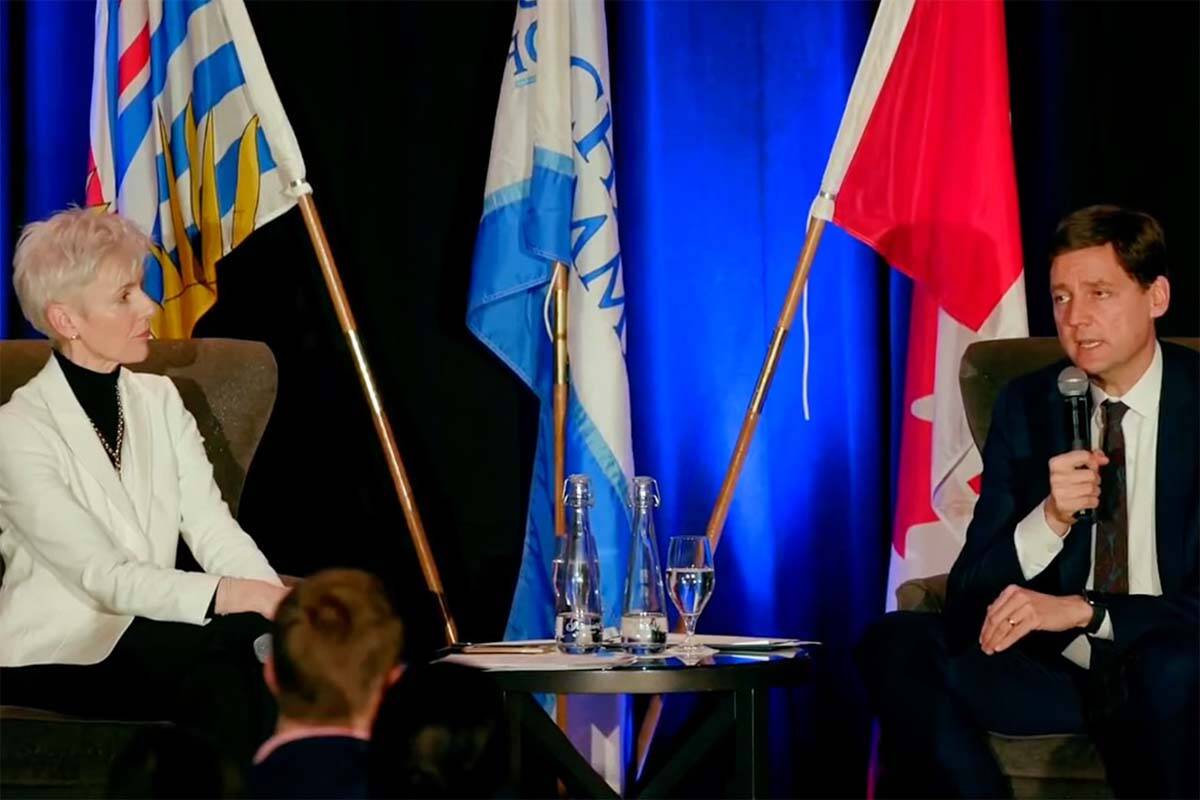Premier David Eby told business leaders Thursday (Dec. 7) economists are projecting 250,000 new homes within the next decade thanks to just two of his government’s five new housing bills (Bill 44 and 47).
Bill 44 increases density across most B.C. municipalities and Bill 47 increases density around transit hubs such as Skytrain stations and bus exchanges.
Eby also used the occasion to defend B.C.’s transition toward a hydrogen-based economy under the auspice of CleanBC with 19 projects currently under consideration in various stages.
“The opportunities are real. They are manifesting in B.C.,” he said. “So I don’t see CleanBC as a disadvantage. In fact, it’s our economic advantage and we are seeing the results,” he added.
Eby made these comments while speaking at BC Chamber of Commerce’s Premier and Cabinet Luncheon in Vancouver.
But he also faced questions about the state of the provincial economy and demands for relief with BC Chamber of Commerce President Fiona Famulak warning of an economic drop-off.
“Please expedite permitting for the large natural resources projects,” Famulak said during the question-and-answer session of Eby’s appearance, following a discussion to bring more mining projects to B.C. as part of a push to explore and exploit critical minerals needed for green technologies.
RELATED: Fall session dominated by housing ends with promise for more housing laws
“We need them to come on stream,” she added, noting LNG Canada and Site C Dam are coming to an end.
“We are going to fall off an economic cliff. We have to fill that void. We have to have some other big projects coming on the back of them. We need those projects to happen, not just because of our want to be a clean, green economy, but we want to make sure that small and medium-sized businesses up and down the stream remain busy.”
Eby’s appearance before business leaders started off with remarks during which he acknowledged business issues including labour shortages, interest rates and the pending end of federal COVID-19 support before pivoting toward housing.
Without housing, B.C.’s prosperity is at risk, he said.
“If they (staff of various skills) cannot afford to live in our province because of housing, business can’t be successful and we (government) can’t deliver the services we need for people,” he said.
The 250,000 figure from Bill 44 and Bill 47 falls above the combined figure that government first announced when those bills were tabled. It also falls in the middle of projections ranging from 216,000 and 293,000, as per government backgrounder. It does not include any housing created by the conversion of short-term rentals and other measures from the government’s broader housing agenda.
Government released these figures and the modelling behind them along with policy manuals that will help municipalities implement these bills on the ground.
But housing was not the only issue during Eby’s appearance. Famulak using her question-and-answer session to probe him on various issues, including recent downward revisions of future economic growth and climate change goals among others.
“There is nothing except our failure to work together that stands between us and very significant economic success,” Eby said, when Famulak asked what he would say to business leaders when it comes to remaining confident.
He added that goverment is working on a number of measures, including permitting, to help the natural resource sector among others.
“The wild care in all of this is obviously the global economy and interest rates,” he said.
RELATED: B.C. Environment Minister to promote B.C. climate change policies at COP28
When asked about the need for a “public, transparent” debate over Clean BC — which Famulak called the “elephant in the room” after the Business Council of British Columbia had published a critical analysis of the plan — Eby said that debate is happening right now.
“I’m very frustrated at our current relationship with the (BCBC) and their economic modelling,” he said. “I do think there is room for us to get together (and) have a conversation about what are the proposed policies, what are the impacts…but we are not there with BCBC currently. I don’t know why that is. It’s not necessary.”
Eby also signalled that the province remains committed to its current timetable to reduce greenhouse gas emissions by 40 per cent by 2030 after Famulak had asked him if B.C. might follow the United Kingdom and weaken its deadlines.
“We believe that by working together (with industry), we can achieve those goals,” he said. “They are not unrealistic. They are achievable.”
The 2023 Climate Change Accountability Report shows British Columbia’s net GHGs are down five per cent from 2018 when government launched CleanBC and down four per cent from the 2007 baseline year. Goals call for B.C. to cut GHGs by 40 per cent by 2030 based on 2007 levels.
@wolfgangdepner
wolfgang.depner@blackpress.ca
Like us on Facebook and follow us on Twitter.

